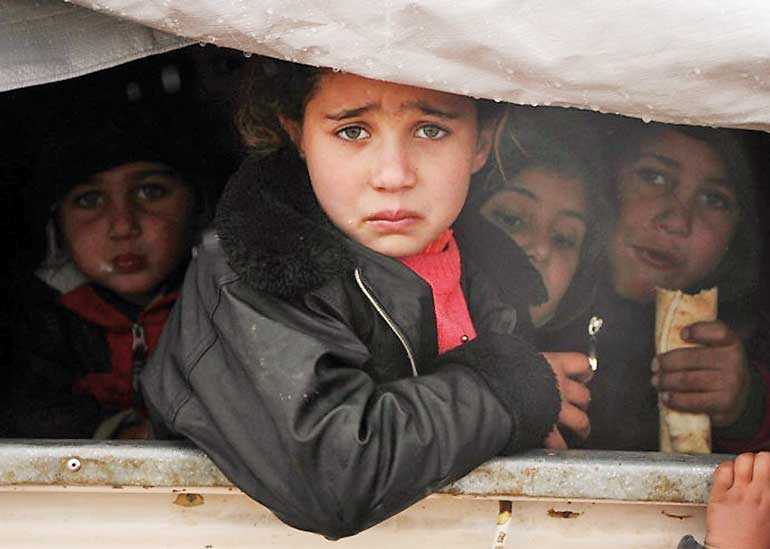Sunday Feb 22, 2026
Sunday Feb 22, 2026
Monday, 30 December 2019 00:01 - - {{hitsCtrl.values.hits}}

A Syrian child reacts upon her arrival in the back of a truck at a camp for displaced people near the village of Harbnoush in the Idlib province after fleeing government forces' advance on Maaret al-Numan in the south of the prvoince, on 27 December - Aref Tammawi/AFP
BRUSSELS, AFP: The EU called on Syria’s regime and its allies to halt “indiscriminate” military attacks on civilians in the country’s north-west, where an intensifying bombardment by Damascus and Russian forces has displaced tens of thousands.
Civilians have streamed out of affected areas of jihadist-dominated Idlib province in recent weeks to escape heightened attacks on the southern edge of the final major opposition-held pocket of Syria, eight years into the country’s devastating war.
“The escalation of violence in the Northwest of Syria by the Syrian regime and its allies must cease,” the EU said in a statement by spokesperson for European Foreign Minister Josep Borrell, which said airstrikes and shelling had led to “countless civilian deaths”.
“All parties have the obligation to protect civilians. The regime and its allies must cease indiscriminate military attacks and respect international humanitarian law,” the statement said.
Violence has intensified since mid-December despite an August ceasefire deal and international calls for a de-escalation.
More than 235,000 people fled the area between 12 and 25 December, mostly from the beleaguered city of Maaret al-Numan, according to the United Nations’ humanitarian coordination agency OCHA.
The EU called for urgent unhindered humanitarian access to the three million civilians thought to be living in Idlib province.
It acknowledged that “terrorist groups” were operating in the region, but stressed that combating these networks “does not permit the undermining of international humanitarian law or the targeting of civilians”.
The Idlib region is dominated by the country’s former Al-Qaeda affiliate, Hayat Tahrir al-Sham.
Residents in the province mainly depend on critical cross-border aid, which came under threat in December after Russia and China vetoed a UN Security Council resolution that would have extended such deliveries for a year.
The move raised fears that vital UN-funded aid could stop entering Idlib from January unless an alternative agreement is reached.
The Damascus regime, which now controls 70% of Syria, has repeatedly vowed to take back the region.
Backed by Moscow, Damascus launched a blistering offensive against Idlib in April, killing around 1,000 civilians and displacing more than 400,000 people.
Syria’s war has killed over 370,000 people and displaced millions since beginning in 2011 with the brutal repression of anti-government protests.